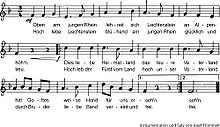Oben am jungen Rhein
| English: High on the young Rhine | |
|---|---|
 | |
National anthem of Liechtenstein | |
| Lyrics | Jakob Josef Jauch, 1850s |
| Music | Derived from "God Save the King" |
| Adopted | c. 1870 (official 1920; modified in 1963) |
| Audio sample | |
U.S. Navy Band instrumental version (one verse) | |
"Oben am jungen Rhein"[a] is the national anthem of Liechtenstein. Written in the 1850s, it is set to the melody of the British anthem, "God Save the King", which in the 19th century had been used for a number of anthems of German-speaking nations, including those of Prussia, Bavaria, Saxony, and Switzerland.
History
[edit]The original lyrics, beginning Oberst am jungen Rhein, were written in the 1850s. The song may be grouped with the German "Rhine songs", i.e. songs that celebrate the River Rhine as part of the German national patrimony, opposing the French territorial claims on the left river bank.
The text is attributed to Jakob Josef Jauch (1802–1859).[1] Born in Saratov, Russia to Swiss Catholic family from Uri, Jauch studied theology in Lucerne and Chur during 1828–1832, and was consecrated as priest in 1833. He served as priest in London during 1837/8–1850. During 1852–1856, he lived in Balzers, Liechtenstein, and befriended Princess Franziska, with whom he planned a model educational institution in Balzers. Due to his progressive stance, Jauch came into conflict with the church hierarchy, and the bishop of Chur ordered him to leave Liechtenstein in 1856. If the attribution of the lyrics to Jauch is correct, the composition would likely date to Jauch's time in Balzers (1852–1856).
The lyrics were not published during Jauch's lifetime. They appeared in print, as the national anthem of Liechtenstein (Die Liechtenstein'sche National-Hymne) only after a period of oral transmission, in 1875, so that the tradition of Jauch's authorship, or the original form of his lyrics, cannot be verified.[2] The song served as Liechtenstein's unofficial, de facto national anthem from the 1870s until its official adoption in 1920.
In 1963, the text was shortened, and reference to the "German Rhine", which had been introduced in the 1920 version, was removed.[3] Oben am jungen Rhein is the only remaining national anthem sharing the same melody with the British "God Save the King" (since the replacement of the Swiss Rufst du, mein Vaterland in 1961).[4][5]
Lyrics
[edit]Usually, the first and last verses are sung.
| German original | IPA transcription[b] | English translation |
|---|---|---|
I |
1 |
I |
See also
[edit]Notes
[edit]- ^ German pronunciation: [ˈoːbən am ˈjʊŋən ˈʁaɪn]; lit. "High on the Young Rhine"
- ^ See Help:IPA/German and German phonology.
- ^ Originally Oberst am deutschen Rhein ("Highest on the German Rhine").[2]
- ^ Originally Im deutschen Vaterland ("In the German fatherland").[2]
- ^ Originally Blühend am deutschen Rhein ("Blossoming on the German Rhine").[2]
- ^ Originally Glücklich und frei! ("Fortunate and free!").[2]
References
[edit]- ^ "Up above the young Rhine (Oben am jungen Rhein)". Cantorian. Retrieved 26 January 2015.
- ^ a b c d e The full seven verses were printed in "Die Lichtenstein's he Nationalhymne", Süddeutsche Presse, 21 March 1875 p. 2. Reprinted from the Süddeutsche Presse report, but shortened to five verses: Das Echo, 16 May 1875, p. 78, Neue Freie Presse Wien, 23 March 1875, p. 2; mentioned as "composed in the 1850s by a Catholic pastor" (in den Fünfziger-Jahren von einem katholischen Pfarrer gedichtet).
- ^ "Liechtenstein". nationalanthems.info. Retrieved 26 January 2015.
- ^ Pound, Jeremy (16 February 2016). "Five intriguing national anthems". ClassicalMusic.com. Retrieved 15 September 2016.
- ^ "How many national anthems are plagiarised?". BBC News. 26 August 2015. Retrieved 15 September 2016.
External links
[edit]- Liechtenstein at a glance – The National Anthem – The Portal of the Principality of Liechtenstein has a page in English about the National Anthem, while the German version of the page has an MP3 instrumental file of the anthem
- Streaming audio, lyrics and information for the Liechtenstein national anthem (archive link)
- Himnuszok – A vocal version of the Anthem, featured in "Himnuszok" website

